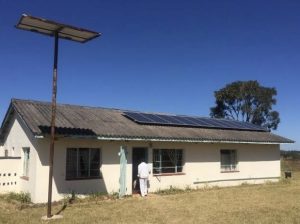KEY POINTS
- Remote locations and poor roads hinder rural healthcare access.
- Workforce shortages leave rural communities underserved.
- Funding gaps and inadequate infrastructure worsen health disparities.
Access to basic healthcare is a cornerstone of human development, yet millions of people in rural Africa still face significant barriers to obtaining even the most rudimentary health services.

Disparities in healthcare access between rural and urban areas are stark, leaving rural communities disproportionately affected by preventable diseases, maternal mortality, and child malnutrition.
Despite global and regional commitments to achieving universal healthcare coverage, rural areas remain underserved due to a confluence of geographic, economic, and social challenges. This article explores the reasons behind this persistent gap, examines its real-world implications, and highlights potential pathways to a healthier future.
Challenges facing rural healthcare
1. Geographical barriers
The remote nature of many rural communities in Africa creates significant challenges for healthcare access. Poor road networks and unreliable transportation systems isolate these areas, making it difficult for residents to reach health facilities.
Emergency cases, such as labor complications or severe illnesses, often become life-threatening due to the time it takes to access care. Seasonal weather changes, such as floods, exacerbate this isolation by cutting off entire regions from essential services. The lack of healthcare infrastructure within proximity compels people to travel long distances, which is often financially and physically unfeasible.
2. Human resource shortages
Africa’s healthcare workforce is concentrated in urban centers, leaving rural areas critically understaffed. Only 15 percent of healthcare workers serve rural populations, despite these regions hosting 50 percent of the continent’s population.

Factors such as poor working conditions, lack of career development opportunities, and limited access to resources contribute to this imbalance. Additionally, the “brain drain” phenomenon, where skilled professionals migrate to urban areas or abroad in search of better opportunities, further depletes rural healthcare systems.
3. Infrastructure constraints
Many rural healthcare facilities are underdeveloped, with inadequate infrastructure, limited medical equipment, and inconsistent electricity or water supply. Clinics are often small, poorly maintained, and unable to meet the demand for services. The absence of diagnostic tools and essential medicines means patients receive suboptimal care, leading to worsening health outcomes. Moreover, the reliance on outdated systems undermines the efficiency and effectiveness of healthcare delivery.
4. Funding limitations
Healthcare in rural areas suffers from chronic underfunding, with national budgets skewed toward urban hospitals and specialized care. Donor funds and international aid, while helpful, are often directed toward high-visibility projects, leaving rural primary care underfunded. The estimated $10 billion annual funding gap for healthcare in Africa reflects the scale of the challenge. Without sustainable investments, rural healthcare facilities remain ill-equipped to serve their communities.
5. Cultural and social barriers
Cultural norms and traditional practices often influence healthcare-seeking behaviors in rural areas. Limited health literacy exacerbates the situation, with many individuals relying on traditional healers or delaying medical treatment due to misconceptions or stigma. For example, maternal health complications are sometimes attributed to spiritual causes rather than biological ones, delaying critical interventions. Language barriers and distrust of formal healthcare systems further hinder access to care.
Scenarios
A rural community in Nigeria
In a remote Nigerian village, residents face a 30-kilometer trek on dirt roads to reach the nearest health center. During the rainy season, flooding renders these roads impassable, leaving people with no access to emergency care. Pregnant women are particularly vulnerable, with many opting for home births despite the risks, as transportation costs are prohibitive.
A healthcare worker in South Africa
A nurse in a rural South African clinic struggles to provide care to a growing patient population with limited medical supplies. She often improvises treatments due to the unavailability of critical medicines and must refer patients to far-off hospitals for diagnostic tests, leading to delays in treatment and poor health outcomes.
A mobile clinic in Kenya
In Kenya, a community health worker has implemented a mobile clinic that travels to isolated villages. Using motorbikes equipped with diagnostic tools and medicines, the initiative has significantly improved access to care for thousands of residents. This innovation highlights the potential of mobile health in bridging rural healthcare gaps.
A rural hospital in Ghana
A public-private partnership in Ghana has transformed a rural hospital by upgrading its facilities, introducing solar power, and providing modern medical equipment. The partnership has also trained healthcare workers, improving the quality of care and reducing patient referrals to urban centers.
Opportunities and future directions
Opportunities
- Technology and innovation
Telemedicine and mobile health platforms offer cost-effective solutions for rural healthcare. By leveraging digital technology, patients in remote areas can consult specialists, access health education, and monitor chronic conditions without traveling long distances. Mobile applications and wearable devices also enable proactive health management. - Community-based initiatives
Empowering community health workers to deliver primary care in rural areas is a proven strategy. These workers act as a bridge between formal healthcare systems and local populations, addressing immediate needs while promoting preventive care. - Public-private partnerships
Collaborations between governments, private companies, and NGOs can enhance healthcare infrastructure and expand service delivery. These partnerships can mobilize resources, introduce innovative technologies, and build sustainable systems tailored to rural needs. - Policy reforms and funding allocations
Advocating for increased budget allocations and targeted policies can strengthen rural healthcare. Decentralized decision-making ensures that resources reach underserved areas, while incentives such as rural hardship allowances attract healthcare workers to these regions.
Challenges
- Sustainability and scalability
Innovative solutions often face challenges in scaling up due to funding constraints or logistical complexities. Ensuring long-term sustainability requires integrating these solutions into national healthcare systems. - Human resource development
Recruiting, training, and retaining healthcare workers for rural areas is essential. Governments must invest in educational programs that encourage rural service and offer competitive compensation packages. - Infrastructure development
Upgrading healthcare facilities and ensuring reliable electricity, water supply, and equipment are foundational steps. Partnerships with infrastructure developers can accelerate progress. - Community engagement
Encouraging local participation in healthcare initiatives fosters trust, improves health literacy, and ensures culturally appropriate solutions. Community ownership is critical for the success of rural healthcare programs.
The lack of basic healthcare in rural Africa underscores the urgent need for targeted interventions to bridge the gap.
Addressing geographical barriers, workforce shortages, and funding constraints requires innovative solutions, community-driven approaches, and sustained investments. By leveraging technology, fostering partnerships, and advocating for equitable policies, Africa can transform its rural healthcare landscape.
Improving access to care is not just a matter of health—it is a foundation for economic growth, social equity, and human dignity. With concerted efforts, a future where every African has access to essential healthcare is within reach.



